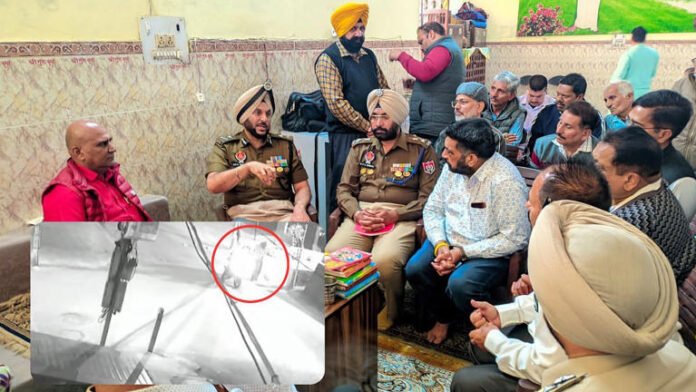A grenade attack at a temple in Amritsar has raised serious security concerns, with the city’s top police official suggesting a potential link to Pakistan’s Inter-Services Intelligence (ISI) and a narco-terrorism module operating in the region. The incident, which occurred in the early hours of the morning, has sparked widespread fears over rising violence and the possible involvement of foreign elements in fueling unrest within India. The attack targeted the Bhagwan Valmiki Mandir in Amritsar, and though no casualties were reported, it has raised alarm about the growing nexus between drug cartels and terrorist organizations.
The Incident: A Shocking Attack
The grenade attack occurred on the premises of the Bhagwan Valmiki Mandir, located in the heart of Amritsar, a city known for its historical and religious significance. The device exploded near the temple’s entrance, damaging the property but fortunately not causing any injuries. The incident, however, has rattled local authorities and residents alike, given the site’s popularity as a religious and cultural hub for the Sikh community.
According to eyewitnesses, the grenade was lobbed by two unidentified individuals who arrived on a motorcycle and quickly fled the scene. The attack was swift and seemed calculated, raising questions about the identity and motive behind the assailants. Local police officials responded immediately, cordoning off the area and launching an investigation into the attack.
Police Chief’s Suspicion: ISI and Narco-Terror Links
The attack has led Amritsar’s senior police officer, Commissioner Arun Pal Singh, to draw links between the incident and the nefarious activities of Pakistan’s ISI and narco-terror networks operating in the region. In a statement to the media, Singh suggested that the grenade attack could be part of a larger conspiracy orchestrated by Pakistan-based elements, particularly the ISI, aimed at destabilizing the region.
Singh noted that there has been a rise in cross-border drug trafficking, often used to fund terrorist activities. He further added that the intelligence gathered indicated that terror groups, including those backed by Pakistan, were increasingly relying on narcotics trade as a means to fund their operations. “We believe this is a part of the larger narco-terror module operating in Punjab, which is allegedly linked to Pakistan’s ISI,” Singh remarked.
The involvement of ISI in fostering unrest in Punjab is not new. In recent years, there have been growing concerns about Pakistan’s role in fueling regional instability through the support of extremist groups. These groups have allegedly been using drug money to finance their operations, including terror attacks like the one witnessed in Amritsar.
Narco-Terrorism: The Growing Threat
Narco-terrorism refers to the growing phenomenon of terrorist organizations using drug trafficking as a means of financing their operations. Punjab, due to its proximity to Pakistan and its strategic location near international borders, has been a hotspot for drug smuggling activities. The state has become a key transit route for narcotics, often smuggled across the international border from Pakistan and then distributed throughout India and other regions.
Authorities have been battling the growing menace of drugs in Punjab for years. Reports suggest that Pakistan-based terror groups, including Lashkar-e-Taiba and Jaish-e-Mohammad, have established strong links with drug cartels operating in the region, often using the drug trade to fund their operations. These cartels, in turn, fund extremist activities and terror attacks, creating a vicious cycle of violence and instability.
The Amritsar grenade attack, therefore, is seen by many as a direct result of this growing nexus between drug cartels and terror groups. The ISI, accused of supporting these activities, has long been suspected of fueling unrest in Punjab through various means, including cross-border drug smuggling, propaganda, and direct support for terror organizations.
Government Response and Investigations
Following the grenade attack, the Punjab government and law enforcement agencies have initiated a comprehensive investigation to uncover the full extent of the conspiracy behind the attack. Security in Amritsar and surrounding areas has been tightened, with police conducting raids and increasing surveillance in an effort to apprehend the suspects behind the attack.
Punjab Chief Minister Bhagwant Mann condemned the grenade attack and assured that authorities would take strict action against the perpetrators. “The government will not allow anyone to disturb the peace of Punjab. Those involved in this heinous act will be brought to justice,” he stated in his response to the incident.
The National Investigation Agency (NIA) has also been roped in to probe any potential links to international terror groups and to unravel the complex network of narco-terror operations that could be fueling unrest in the region. The NIA’s involvement highlights the gravity of the situation and the need for a coordinated response from central and state agencies to address the growing threat of cross-border terrorism and narcotic trade.
Local Reactions and Concerns
The grenade attack has left the residents of Amritsar shaken, with many expressing concerns over their safety. The Bhagwan Valmiki Mandir, a place of religious and cultural significance, has long been a symbol of peace and unity in the city. The attack on such a revered site has left many questioning the growing security challenges facing Punjab, especially with the continued threat of cross-border terrorism.
Local communities, particularly those in border areas, have expressed fear over the rising tide of violence and the growing influence of terror-linked drug cartels. Many believe that addressing this issue will require a multi-faceted approach, including stricter border security, better intelligence-sharing, and an end to the growing drug trade in the region.
Conclusion
The grenade attack in Amritsar has once again brought to the forefront the dangerous nexus between narco-terrorism and cross-border terrorism, with Pakistan’s ISI allegedly playing a central role in fueling unrest in Punjab. As investigations continue, authorities are hopeful that they will be able to dismantle the network behind this attack and prevent further violence. For now, the people of Amritsar and Punjab remain on edge, waiting for justice and a resolution to the growing security threats in the region.

